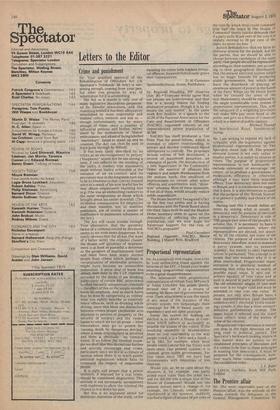Proportional representation
Sir: As a relatively new reader, won over by your unflinching stand against the lunacies of the EEC, I found your leader attacking proportional representation to be a great disappointment.
The infatuation with proportional representation of certain Tory MPs such as Julian Critchley has arisen purely because they see it as a means of keeping Mr Benn out of government for ever. Their attachment is not the result of any sense of the injustice of the present system; not surprisingly their, campaign for PR is based purely on expediency and not upon principle.
Surely the reason for holding an election is to obtain a House of Commons which reflects as accurately as possible the wishes of the voters. If the resulting assembly in Westminster bears no true relationship to the way people voted, it is a farce and a fraud — as in 1951, for example, when most people voted Labour but the Tories won more seats. Our present system, it is claimed, gives stable government. Yet four times since 1951 we have had Governments with majorities of less than ten.
Would you, sir, be so calm about the situation if, for example,, one party polled more votes than the other two and yet did not win a single seat in the House of Commons? Would not the present system merit a change if, for example, the Liberals, totally underrepresented at the moment, suddenly reached a figure of around 30 per cent of the vote by which they could command over half the seats in the House of Commons? Surely justice demands that if a party polls 30 per cent of the vote it is morally entitled to 30 per cent of the seats, no more, no less.
Justice demands too that we have an electoral system for the people, not for the parties; that we should be able to choose between candidates of the same party, that people should be represented according to their numbers, not according to their geographical distribution; that the present electoral system which has no magic formula for producing stable governments, but which does have the drawback of placing an enormous amount of power in thel-sands of the Party Whips (as Mr Heath knew when he twisted the arms of the anti-Marketeers), should be replaced by the single transferable vote system of proportional representation. This, with the safeguard of a weighting provision, will make MPs pay more heed to the public and give us a House of Commons which is a mirror of public opinion. Michael Thomas 44 Beechwood Road, Sanderstead, Surrey
Sir: I am writing to express my lack of sympathy with the arguments against proportional representation in The Spectator dated July 19. The present electoral system is not only unfair to smaller parties, it is unfair to citizens as voters. The purpose of proportional representation is not necessarily to exclude extremists or encourage 'the centre', or to produce a government of moderation, efficiency or otherwise, although it may have these desirable effects. True democracy does not exist in Britain and it is erroneous to suggest that it does. It is also erroneous to state
that the purpose of the 'British System' is to preserve stability and choice of the centre.
Having said this I would define my terms by stating what is meant by democracy and the purpose of elections in a democracy. Democracy is rule of THE people (not some of the people). To achieve this, it is necessary to have a representative parliament, where the representatives are elected, not select ed, by all the citizens, not some of the citizens. The purpose of elections in a democracy, therefore, is not to maintain a party system, not to preserve 'stability', but merely to elect representatives to parliament. This concept is so simple that one wonders why it is so often overlooked. Proportional representation is a practical method of ensuring that votes have as nearly as possible equal value. It sets out to achieve equality of vote value and as such is neutral in party political terms.
The old reformists' slogan of 'one man one vote' is no longer valid and must be amended to 'one vote one value.' At present, not only does Britain have a most unrepresentative (and therefore undemocratic) electoral (vote-count ing) system, it also has a most unrepresentative parliamentary system. The
upper house is selected and the lower house reflects some f the wishes of some of the citizens. '
Proportional representation is merely one stop in the right direction on the long road to political justice. The Spectator's backward-looking stance in this matter does no justice to its established principles of liberalism and if it wishes to be true to these principles in wanting true democracy, it must be prepared for the consequences, however much these consequences upset the established order.
J. F. Rider 5 Lynton Gardens, Bush Hill Park, Enfield.













 Previous page
Previous page